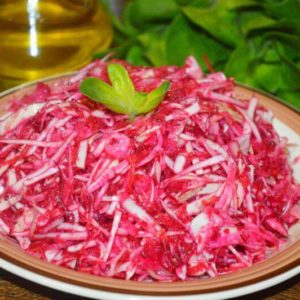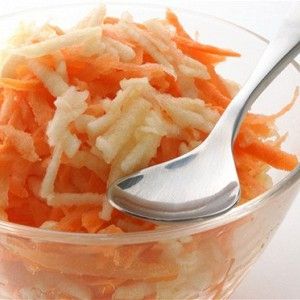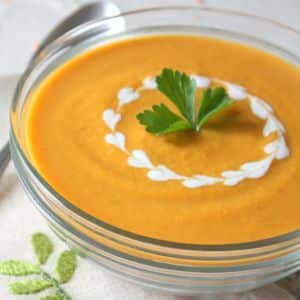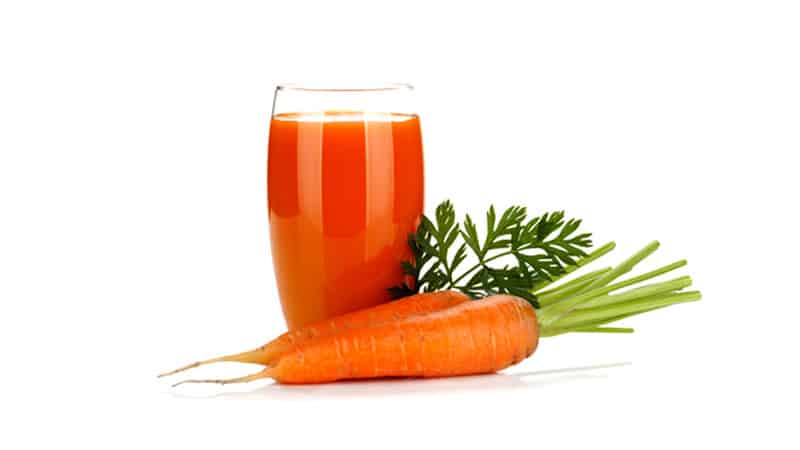How many carrots should you eat to improve your eyesight and what vitamins are included?
Parents and educators often persuade children to eat something tasteless under the motto “it’s good for health.” Sometimes these persuasions include the phrase “eat carrots, they are good for your eyesight,” which does not inspire unconditional child trust.
Let's figure out how much truth there is in these persuasions and whether carrots actually improve vision.
Chemical composition and nutritional characteristics of carrots
Heat treatment changes the properties and composition of carrots. The table shows the nutritional indicators and chemical composition of raw and thermally processed vegetables.
| Nutritional Indicators and Nutrients | Amount per 100 g of raw carrots | % of recommended daily intake | Amount per 100 g of heat-treated carrots | % of recommended daily intake |
| Squirrels | 0.93 g | 2 | 1.3 g | 2 |
| Fats | 0.24 g | 0 | 0.1 g | 0 |
| Carbohydrates | 6.78 g | 2 | 6.4 g | 2 |
| Water | 88.29 g | — | 88.7 g | — |
| Alimentary fiber | 2.8 g | 14 | 2.4 g | 12 |
| Calorie content | 41 kcal | 2 | 33 kcal | 2 |
| Vitamin A (from carotene) | 835 mcg | 93 | 1001 mcg | 111 |
| Lycopene | 1 mcg | — | — | — |
| Lutein and zeaxanthin | 256 mcg | — | — | — |
| Vitamin E | 0.66 mg | 4 | 0.4 mg | 3 |
| Vitamin K | 13.2 mcg | 11 | — | — |
| Vitamin C | 5.9 mg | 7 | 3.8 mg | 4 |
| Vitamin B1 | 0.07 mg | 5 | 0.05 mg | 3 |
| Vitamin B2 | 0.06 mg | 3 | 0.06 mg | 3 |
| Vitamin B5 | 0.27 mg | 5 | — | — |
| Vitamin B6 | 0.14 mg | 7 | — | — |
| Vitamin B9 | 19 mcg | 5 | — | — |
| Vitamin PP | 2.16 mg | 11 | 1.7 mg | 9 |
| Kholin | 8.8 mg | 2 | — | — |
| Potassium | 320 mg | 13 | 154 mg | 6 |
| Calcium | 33 mg | 3 | 27 mg | 3 |
| Magnesium | 12 mg | 3 | 34 mg | 9 |
| Sodium | 69 mg | 5 | 17 mg | 1 |
| Phosphorus | 35 mg | 4 | 51 mg | 6 |
| Iron | 0.3 mg | 2 | 0.6 mg | 3 |
| Manganese | 0.14 mg | 7 | — | — |
| Copper | 0.05 mg | 5 | — | — |
| Selenium | 0.1 mcg | 0 | — | — |
| Fluorine | 3.2 mcg | 0 | — | — |
| Zinc | 0.24 mg | 2 | — | — |
An increase in the amount of active carotenes during heat treatment of carrots is associated with the transition of indigestible forms of carotene-like substances into digestible carotenoids as a result of hydrolysis. However, during heat treatment, the amount of other vitamins, biologically active substances and mineral nutrients decreases. Therefore, the method of preparing the root vegetable directly affects the properties of this vegetable and the benefits for vision.

Biologically active substances of carrots for improving vision
Carrots are really good for your eyesight. The main biological components that help maintain the health of the visual system:
- beta-carotene (provitamin A);
- lutein;
- zeaxanthin;
- lycopene;
- magnesium;
- calcium;
- potassium.
Let's take a closer look at the mechanism of action of each component of the orange root vegetable.
Beta-carotene and vitamin A
Beta-carotene prevents the accumulation of free radicals that destroy body cells and exhibits antioxidant properties. Under the action of enzymes in the body, one molecule of beta-carotene is split into two molecules of retinol (vitamin A). This is the main vitamin in carrots for maintaining vision.
Retinol does not directly affect the visual system and is not able to cure or prevent farsightedness and myopia. Its function is to synthesize the pigment rhodopsin, which detects weak light in the retinal receptors called rods. Therefore, eating carrots primarily helps improve twilight vision.

Vitamin A stimulates the mucous glands in the corners of the eyes, the secretion of which protects the visual apparatus from drying out and damage.Retinol is a regeneration stimulator that helps restore the body, including the visual system, after infections and injuries.
Interesting things on the site:
The benefits of boiled carrots for health and beauty
Lutein and zeaxanthin
Lutein and zeaxanthin are chemically similar substances that perform the same function in the body.. These compounds accumulate in the retina, choroid, iris and lens of the eye. They improve accommodation by reducing the influence of chromatic aberration (deviation in the direction of passing light rays) when a beam of light passes through the lens, thereby increasing visual acuity.
Another function of lutein and zeaxanthin is antioxidant. The largest amount of these substances accumulates in the macula of the retina. They prevent cancerous degeneration of cells in this area of the visual apparatus and are effective in preventing eye cancer.
Lycopene
Lycopene is a strong antioxidant. In old age, one of the causes of visual impairment is macular degeneration of the retina, caused by an excess of oxidizing radicals.
Due to its antioxidant and anti-inflammatory properties, lycopene is useful for preventing cataracts and preventing degenerative processes in the pigment epithelium that cause macular degeneration.

Minerals
Calcium is necessary to strengthen the framework of the sclera of the eyes: with its deficiency, especially in adolescence, there is a sharp deterioration in vision. Magnesium regulates the relaxation and tension of vascular smooth muscles and muscles of accommodation.With its deficiency, intraocular pressure increases, visual acuity decreases, and overwork of the eye muscles is observed. Potassium removes excess fluid from the body, therefore it is useful for the prevention of glaucoma.
How to eat carrots to improve vision
The recommended daily intake of carrots to maintain eye health is 50-150 g. To improve twilight vision, boiled root vegetables are used, as they contain the largest amount of carotene. To prevent glaucoma and cataracts, maintain visual acuity and prevent the development of eye cancer, carrots are consumed raw.
Carrot juice is good for your eyes. For preventive purposes, take up to 750 ml of freshly squeezed juice daily on an empty stomach. To feel the results from taking carrot juice, the course must last at least 30 days.
Attention! Daily consumption of foods containing carotene, including carrots and dishes based on this root vegetable, can lead to an orange coloration of the skin due to the accumulation of pigment in the epidermis layer. This side effect is a sign of vitamin A hypervitaminosis, in which case you should stop eating carrots.

Carotenoids, lutein, zeaxanthin and lycopene are fat-soluble compounds. To improve the absorption of these substances by the body, carrots are taken with butter or sour cream, that is, with foods containing fats.
To maintain immunity and improve the condition of the retina, use carrot tops. The main biologically active components of the tops:
- vitamin C;
- B vitamins;
- vitamin D;
- vitamin E;
- vitamin K;
- iron and magnesium.
To remove bitterness, but not reduce the amount of useful nutrients, the tops are kept in boiling water no longer than 15 minutes. For preventive purposes, crushed tops are added to dishes as a seasoning.

Carrot recipes to maintain eye health and improve vision
To make the eye healing process more comfortable, use a few simple and healthy recipes.
Carrot breakfast
This recipe doesn't take much time or effort. This delicacy is familiar to many from childhood; it was loved to be prepared for children in preschool and school institutions of the Soviet Union. A carrot breakfast will help preserve not only your eyesight, but also your figure, and is also suitable for lovers of vegetarian cuisine.
Ingredients for 4 servings:
- fresh carrots – 200 g;
- apples – 200 g;
- vegetable oil – 2 tbsp. l.;
- sugar or syrup - to taste;
- cinnamon, nutmeg - to taste.
Peel the apples and carrots, remove the apple seeds, and grate the ingredients on a fine grater. Add butter, sugar and spices, mix.
Salad "Brush"
In addition to the visual apparatus, this dish improves the work cardiovascular and digestive systems.
 Ingredients for 3 servings:
Ingredients for 3 servings:
- raw carrots – 100 g;
- raw beets – 100 g;
- fresh white cabbage – 100 g;
- vegetable oil or sour cream - 1 tbsp. l.;
- salt and spices - to taste.
Peel carrots and beets. Vegetables are grated on a coarse grater, seasoned with butter or sour cream, salt and spices are added as desired and mixed.
Read also:
Chicken and boiled carrot puree
This dish is used to prevent and treat night blindness. It is consumed for breakfast or dinner and is suitable for people on a diet.Chilled puree can be used instead of sandwich spread to treat yourself to tasty and healthy snacks throughout the day.
 Ingredients for 2 servings:
Ingredients for 2 servings:
- carrots – 200 g;
- chicken fillet – 200 g;
- olive or sunflower oil – 2 tbsp. l.;
- salt and spices - to taste.
Chicken meat and carrots are boiled until tender. Peel the carrots and cut into large pieces. The fillet is cooled and chopped. Add oil, salt and spices, then mix the ingredients and grind with a blender until smooth.
Candied carrots
This recipe is suitable for those who have a sweet tooth and will successfully replace candy in their diet. Despite the long preparation time, it’s worth trying to make this dessert – you’ll be pleased with the results.
Candied fruits contain a large amount of carotenoids - they will help restore twilight vision. Candied fruits are a clever way to treat children to a healthy vegetable instead of sweets.
 Ingredients:
Ingredients:
- fresh carrots – 500 g;
- water – 350 ml;
- sugar – 500 g;
- lemon juice from 1 lemon;
- powdered sugar or sprinkles - optional.
The carrots are peeled and cut into cubes, poured with water, brought to a boil and left to cook for 10 minutes under a closed lid. Remove the finished carrots with a slotted spoon and rinse with cold water. Add sugar to the water and bring to a boil again with constant stirring. Dip carrots into boiling syrup and boil for 15 minutes, after which the fire is turned off.
Leave the carrots to infuse in the syrup for 10 hours, then the boiling and infusion procedure is repeated 2 more times. Thus, it takes about 31 hours to candy carrots.
After candiing, the syrup is decanted (it can be stored in the refrigerator and used later for preparing sweet pastries), the carrot pieces are laid out on parchment paper for baking so that they do not touch each other.
Candied fruits are sprinkled with lemon juice and dried in the oven at minimum temperature and the door open or in an electric dryer. The finished product can be rolled in powdered sugar. Store the healthy sweet in a glass jar at room temperature.
The benefits and harms of carrots
Carrots are good not only for the eyes, but also for the full functioning of other body systems.
Useful properties of carrots:
 The low carbohydrate content makes it possible to include orange root vegetables in the diet of patients with diabetes.
The low carbohydrate content makes it possible to include orange root vegetables in the diet of patients with diabetes.- Regular consumption of carrots reduces cholesterol levels and the risk of stroke and vascular pathologies.
- Root vegetables and carrot tops are recommended for use for hypertension.
- High antioxidant content reduces the risk of cancer.
- Carrot juice has a choleretic and weak diuretic effect, and has a beneficial effect on the functions of the kidneys and liver.
- Vitamin A, produced in the body from carotene, stimulates tissue regeneration and has a wound-healing and rejuvenating effect.
- Low calorie and dietary fiber content helps with bowel cleansing and weight loss.
Carrots can be harmful if consumed in excess of 300 g per day. If the consumption norm is exceeded, symptoms of vitamin A hypervitaminosis occur:
- constant headache;
- aches in the joints of the limbs;
- dryness and flaking of the skin;
- brittle nails and hair, hair loss;
- increased body temperature;
- yellowness of the skin on the palms;
- the appearance of hematomas on the skin due to minor injuries;
- dryness of the mucous membranes of the eyes, pain in the eyes, burning sensation.
If a number of similar symptoms appear, you should exclude dishes with carrots from your diet and seek medical help.

Contraindications to eating carrots
If you decide to increase your carrot intake for eye health, first find out whether such a diet will harm you.
Contraindications for eating roots and tops:
- food allergy to carrots;
- gastritis and other inflammatory diseases of the stomach and duodenum.
For other diseases, carrots do not cause harm if you eat no more than 300 g per day.
Conclusion
Carrots are good for the eyes as they contain natural antioxidants, vitamins and minerals. 100 g of this root vegetable covers the daily requirement for vitamin A. Thanks to carotene, twilight vision improves. Lutein and zeaxanthin improve accommodation and help with myopia and farsightedness. Lycopene is effective in preventing cataracts. Antioxidants and vitamin C in carrots improve the condition of retinal blood vessels and prevent the occurrence of cancer.
To treat night blindness, carrots are used boiled. Raw root vegetables and carrot juice are effective in treating and preventing other visual problems. For preventive and therapeutic purposes, it is recommended to consume up to 150 g of carrots daily. The daily dose of orange root vegetable is no more than 300 g to avoid the occurrence of vitamin A hypervitaminosis.